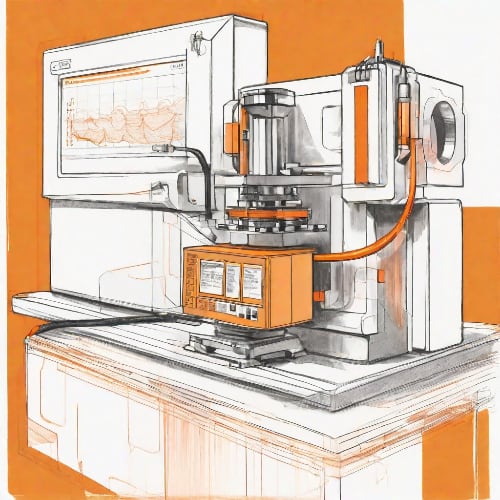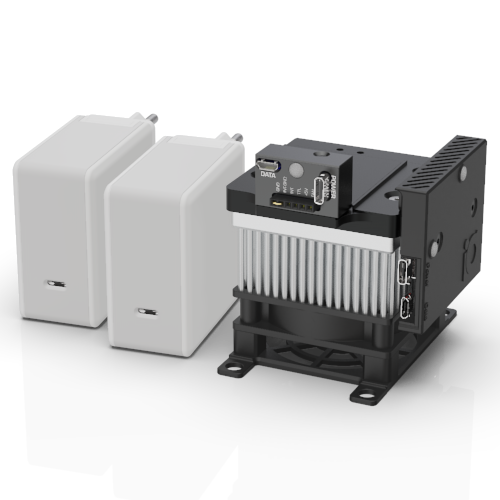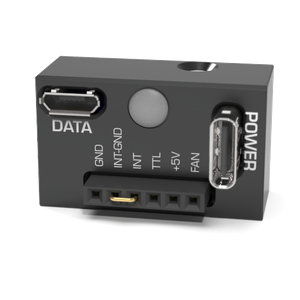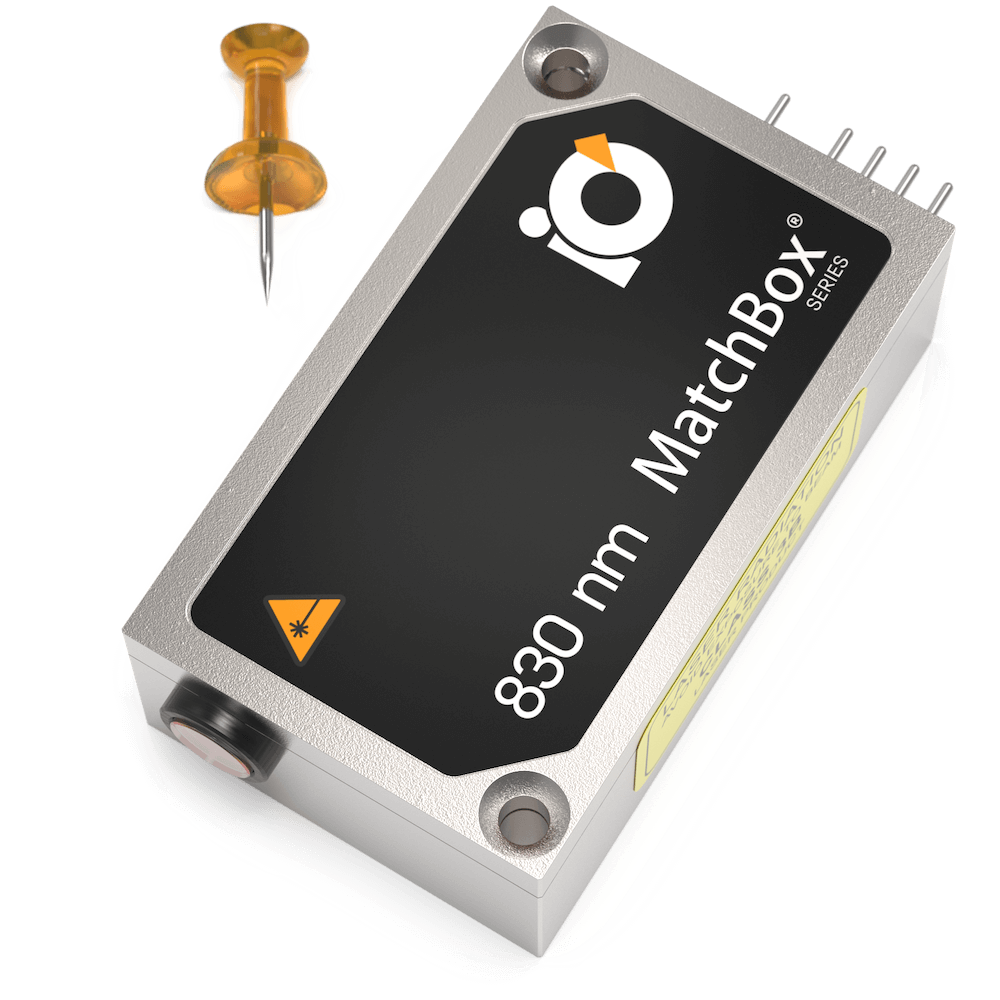830 nm Tunable Laser
Item Code: 0830T-41A-NI-NT-NFDescription
The transversal modes are distributed in one row, thus the fast axis can be focussed with M2 ~1.3, while the slow axis has multiple modes and its focusability is poor - theoretically, it can be focussed to a width of ~50 µm.
This laser is a Volume Bragg Grating (VBG) stabilized diode laser, which is distinguished by high electrical efficiency and exceptional wavelength stability.
Laser Rental
Rent a high-performance laser for a time-limited experiment. Or try several laser options before deciding, which to choose.
Success
Your request has been sent successfully. We'll get back to you as soon as possible.
Back to homepageRequest
Begin your product purchase process, with flexibility for customization based on your needs.
Success
Your request has been sent successfully. We'll get back to you as soon as possible.
Back to homepage| Parameter | Minimum Value | Typical Value | Maximum Value |
|---|---|---|---|
| Central wavelength, nm | 829.7 | 830 | 830.3 |
| Longitudinal modes | - | Narrow Spectrum | - |
| Spectral line width FWHM, pm | - | 50 | 100 |
| Output power, mW 1 | - | 450 | - |
| Side-mode suppression ratio (SMSR), dB 2 | - | 50 | - |
| Power stability, % (RMS, 8 hrs) 3 | - | 0.1 | 0.5 |
| Power stability, % (peak-to-peak, 8 hrs) 4 | - | 2 | 3 |
| Intensity noise, % (RMS, 20 Hz to 20 MHz) 5 | - | 0.3 | 1 |
| Transversal modes | - | Multiple | - |
| Beam diameter at aperture (1/e2), mm | - | 0.5 x 2 | - |
| Polarization direction 6 | - | Unpolarized | - |
| Control interface type 7 | - | UART | - |
| Operation mode | - | APC (CW) | - |
| Modulation bandwidth, MHz 8 | - | N/A | - |
| Input voltage, VDC | 4.8 | 5 | 5.3 |
| External power supply requirement | - | +5 V DC, 1.5 A | - |
| Dimensions (WxDxH), mm 9 | - | 50 x 30 x 18 | - |
| Beam height from the base, mm | 9.9 | 10.4 | 10.9 |
| Heat-sinking requirement, °C/W | - | 1 | - |
| Optimum heatsink temperature, °C | 15 | 20 | 30 |
| Warm up time, mins (cold start) | 0.2 | 1 | 2 |
| Temperature stabilization | - | Internal TEC | - |
| Overheat protection | - | Yes | - |
| Storage temperature, °C (non-condensing) | -10 | - | 50 |
| Net weight, kg | 0.1 | 0.12 | 0.14 |
| Max. power consumption, W | 0.4 | 2 | 10 |
| Warranty, months (op. hrs) 10 | - | 14 (10000) | - |
| RoHS | - | Yes | - |
| CE compliance | - | - General Product Safety Directive (GPSD) 2001/95/EC - (EMC) Directive 2004/108/EC |
- |
| Laser safety class | - | 4 | - |
| OEM lasers are not compliant with | - | IEC60825-1:2014 (compliant using additional accessories) | - |
| Country of origin | - | Lithuania | - |
| Tunabilty range, nm | - | -0/+1 | - |
1 The output power of SLM lasers shall not be tuned and SLM performance is not guaranteed at power ratings other than factory preset. However, the power setting capability is not disabled. External attenuators are recommended instead.
2 Without a clean-up filter installed.
3 The long term power test is carried out at constant laser body temperature (+/-0.1 °C) using an optical power meter with an input bandwidth of 10 Hz. The actual measurement rate has a period of about 20 seconds to 1 minute.
4 The long term power test is carried out at constant laser body temperature (+/-0.1 °C) using an optical power meter with an input bandwidth of 10 Hz. The actual measurement rate has a period of about 20 seconds to 1 minute.
5 Noise level is measured with a fast photodiode connected to an oscilloscope. The overall system bandwidth is from 2 kHz to 20 MHz.
6 For lasers without integrated optical isolators.
7 Break-out-boxes AM-C8 and AM-C3 can be used for conversion of UART communication to either USB or RS232.
8 SLM lasers shall not be modulated - use external modulators instead.
9 Excluding control interface pins and an output window/fiber assembly.
10 Whichever occurs first. The laser has an integrated operational hours counter.
Typical spectrum
Typical spectrum of 0830T-41A nm diode laser. Measured with 10 pm resolution.

Drawing
The key dimensions of a free-space MatchBox.


Raman Spectroscopy
Raman Spectroscopy is a powerful analytical technique that explores molecular vibrations by measuring inelastic scattering of monochromatic light. It provides valuable insights into molecular structure, composition, and chemical bonding, making it widely used in material science, chemistry, and biology. The unique spectral fingerprints obtained through Raman spectroscopy enable non-destructive and precise identification of substances, making it a versatile tool for research and quality control applications.

Confocal Microscopy
Confocal microscopy is a powerful imaging technique used in biological and materials science research. By employing point illumination and a spatial pinhole, confocal microscopy eliminates out-of-focus light, resulting in sharper, high-resolution images. This method enables three-dimensional imaging of specimens with exceptional optical sectioning, making it valuable for studying biological structures and dynamic processes at the cellular and subcellular levels.

Quantum Cryptography
Quantum cryptography is a way of securing information using the principles of quantum physics. One method of quantum cryptography is quantum key distribution (QKD), which allows two parties to share a secret key that can encrypt and decrypt messages. QKD uses entangled photons, which are pairs of light particles that have a quantum connection and share the same properties. By measuring the polarization of one photon, the other photon will have the same polarization, even if they are far apart. This way, the two parties can generate a random sequence of bits that form the key. However, to create and send entangled photons from space, they need small lasers that can fit into smallsats.
MatchBox Laser High-Performance Accessory Bundle

Standalone High-Performance Accessory Bundle

USB Break-out-Box for Single-Wavelength MatchBoxⓇ

RS232 Break-out-Box for Single-Wavelength MatchBox®

60W USB type C power supply

Air Cooled Heatsink With TEC

Stand-alone Air Cooled Heatsink With TEC

Compact TEC-Cooled Mounting Plate For MatchBox

MatchBox Laser Shutter for 16 mm Cage System

XZ Axis Adjustable Shutter With Internal SM05 Thread

Safety key box

Laser Safety Goggles for 200-400 nm, 765-1080 nm



